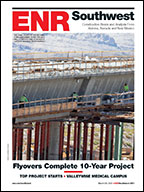With a deficit looming within months for the Highway Trust Fund’s highway account, industry officials are gearing up to try to get Congress to fix the problem. If lawmakers don’t add more revenue before the new fiscal year begins on Oct. 1, highway advocates warn a major cut in federal road aid will be needed to put the account in the black.
In February, the Bush administration estimated the highway account will show a $3.2-billion deficit for fiscal 2009; the American Road and Transportation Builders Association says the shortfall is $3.7 billion. Unless revenue is added to the highway account, ARTBA and other groups say it would require a 32% cut in highway funding to erase the deficit. “It’s critically important that Congress act to mitigate this trust-fund shortfall,” says Jack Basso, the American Association of State Highway and Transportation Officials’ director of management and business development.
There is a “fix” under discussion, but no final deal yet: The Senate Finance Committee last September approved a plan to add $5 billion to the highway account, without hiking motor-fuel taxes. Such a boost almost certainly would draw a presidential veto.
| |||||||||
The Bush administration offered a different solution, proposing to shift $3.2 billion to the trust fund’s highway account from its transit account. But Senate transportation-housing appropriations subcommittee Chairwoman Patty Murray (D-Wash.) at an April 3 hearing termed the administration’s proposals “unrealistic and irresponsible.” The panel’s top Republican, Christopher Bond of Missouri, said of the transit shift, “That’s what I’d call putting a small Band-Aid on a bleeding wound.”
Jay Hansen, vice president for government affairs at the National Asphalt Pavement Association, calls the Finance Committee plan “the only game in town.” The trick is to find a legislative vehicle to carry Finance’s proposal. One possibility is an extension to keep aviation programs going when a current stopgap lapses on June 30. Other options include a bill to shield many people from the alternative minimum tax in 2008, extensions for expiring tax breaks or maybe a new economic stimulus package.
This summer, the Treasury Dept. and Congressional Budget Office will update estimates of the trust fund’s financial health. Cathy Connor, Parsons Brinckerhoff’s senior vice president for government affairs, says those numbers will be “a huge driver [for legislative action] if we haven’t solved this by that point.”
James Ray, the Federal Highway Administration’s acting administrator, says if there is no remedy for the shortfall, federal funding reimbursements to state highway agencies would be slowed. But Ray says, “I have faith that it will be fixed somehow.”


Post a comment to this article
Report Abusive Comment